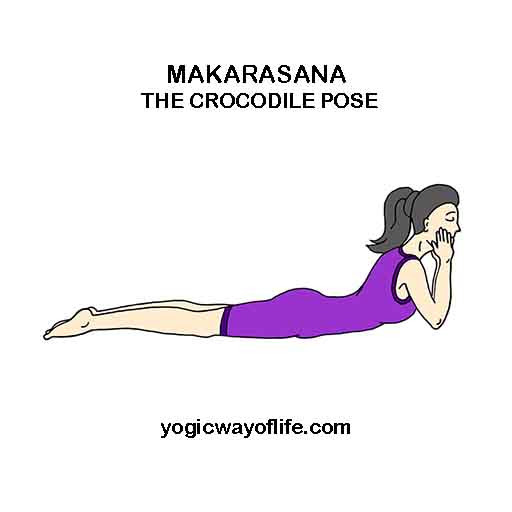Makarasana or the Crocodile pose is a yoga asana used for relaxation. In sanskrit, ‘Makar’ means crocodile and ‘Asana’ means a pose. Makarasana is a yogic pose useful for people with back and shoulder problems.

How to Do Makarasana (The Crocodile Pose)?
- Lie down on the floor on your stomach with your hands folded under the head.
- Place the palms on your shoulders in a relaxed way and close your eyes.
- Stretch the legs as far as possible. The toes should point outwards.
- Relax the whole body. Breathe normally and slowly. Feel the whole body touching the ground and the deep relaxation in all your muscles.
- Relax in this posture for 2 – 5 minutes.
Releasing the Makarasana Position
1. Slowly bring the feet together.
2. Unfold the arms and come to the Prone Position.
Benefits of Makarasana (The Crocodile Pose)
This asana can be done as a relaxation pose between other asanas or it can be relaxation method when you are tired. You can be in this asana for a prolonged period of time if you are tired after a workout. It gives deep relaxation to the shoulders and the spine.
Alternate Method for performing Makarasana
There is an alternate method of performing this asana.
- Lie down on your chest with head on the floor
- Place the elbows on the ground. And raise your head and shoulders.
- Rest the head in the palms of the hands.
- The legs should be kept straight and relaxed.
- Keep the eyes closed.
- Remain in this position for 2 – 5 minutes
Releasing the Position
- Slowly remove the palms from under the chin and roll over and lie down on your back.
- If you feel any tension in the back muscles, you may want to do a slight forward bend, without strain. Please remember that too much of forward bending should be avoided by patients with slipped disk.
Benefits of Makarasana Variation
This variation of Makarasana is excellent for people suffering from spondylitis, slipped disk or any other spinal disorder. They can maintain this position, for as long as it is comfortable. This variation is also good for asthmatic patients and people with lung disorders.
